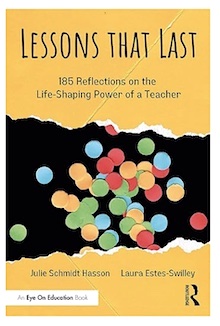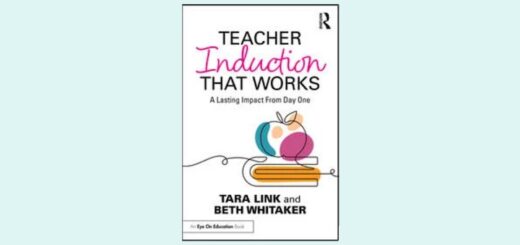Reflections on Teachers’ Life-Shaping Power
Lessons That Last: 185 Reflections on the Life-Shaping Power of a Teacher
By Julie Schmidt Hasson and Laura Estes-Swilley
(Routledge/Eye On Education, 2024 – Learn more)
Reviewed by Ruth A. S. Miller

Its versatility is a key feature, making it a valuable resource for individual use, group discussions, or faculty-wide reflections. Its adaptable design allows educators to customize their reflection process to specific contexts and needs.
The book’s lessons are drawn from narratives that former students shared with the authors about interactions with teachers who made a difference in their lives. Each lesson is accompanied by an impact statement, such as This lesson helped me understand the importance of empathy in teaching, providing a solid foundation.

The index is divided into story themes, so if – for example – you are looking for inspiration while working with student communities, you have sixteen stories to reference, making your reading experience more productive.
Highlights and Ideas from the Book
Question Box: Create a question box with index cards for students to anonymously ask questions about their new teacher or class, reducing stigma and anxiety.
Attend Student Events: Make an effort to attend more games, programs, and after-school activities students are involved in.
Friendship Quote: Post the quote “The best way to get a friend is to be a friend” on a bulletin board to encourage friendship.
Provide Space for Grief: When a student loses a loved one, give them space and an opportunity to write about their feelings to help them process their grief.
Engage in Positivity: Use the quote “Life is what you make of it” to encourage students, especially those who are pessimistic about assignments.
Respect for All Students: Treat students with disabilities respectfully and do not single them out or make a big deal about their condition.
Highlight Strengths: Make time to highlight student strengths through notes and phone calls home to encourage positivity.
Play and Pause Learning: Recognize the importance of play and occasionally pause learning to create memorable experiences.
Support Social Skills: Identify students who can positively influence the classroom atmosphere and assist those struggling to make friends.
Be a Caring Adult: Pay attention to small changes in students, such as hunger or distress, and respond with care.
Coupon System: Implement a coupon system to focus on and reward positive behavior in the classroom.
Encourage Self-Advocacy: Always remind students that asking for help is okay, fostering self-advocacy.
Speed Debating Activity: For meaningful fun, use “speed debating” to develop social skills and strategies by having students debate light-hearted topics.
Clarify Assumptions: When students have conflicts, ask them, “What do you know for sure, and what are you assuming?” to promote clear thinking.
Affirming Messages: Write and change affirming messages around the classroom mirror using a dry-erase marker.
Providing More Options: Discover students’ interests and strengths and offer more options for book reports and projects.
Community Service: Help the student council advisor to set up more community service opportunities for students.
Education Quote: Post the quote “A good education is a privilege” to inspire students.
Encourage Reflection: Use writing activities to reflect on feelings and experiences, such as responding to a song.
Interviewing Relatives: Have students interview an older relative or neighbor about significant life events and then write their stories.
Tools to Make a Difference for Students
In conclusion, Lessons That Last is an indispensable guide for educators looking to enrich their teaching practices, foster a positive, impactful learning environment, and meet diverse educational needs. The book’s versatile design and wealth of practical strategies is augmented by an well-organized, easy-to-navigate quick reference table of contents. And it’s well suited for individual reflection, group discussions, or broader faculty engagement.
By emphasizing the significance of a teacher’s work and celebrating the powerful relationships between teachers and students, Lessons That Last bolsters our commitment to a profession that is often undervalued.
I am particularly excited to share these insights and strategy with my colleagues and administration, and I am confident they will appreciate the book’s potential to transform our teaching practices. Ultimately, Lessons That Last is a testament to the profound impact that thoughtful, dedicated teaching can have on students’ lives.
Read an article by Lessons That Last author Julie Hasson.
Ruth A. S. Miller is a National Board Certified Teacher Candidate and a 6th grade ELA teacher in Southern Maine. She has her Masters in Literacy (K-12) and Bachelors in Elementary Education (K-8). She serves as the school’s Student Council Advisor, the Facilitator of the Literacy Program for Parents and Students, and a mentor.
As a lifelong learner, Ruth is an active member of the Maine Council of English Language Arts (MCELA). She encourages her students to share her classroom library, with historical fiction being her favorite genre. Ruth believes there is no better way to teach future leaders about history than through literature.





























